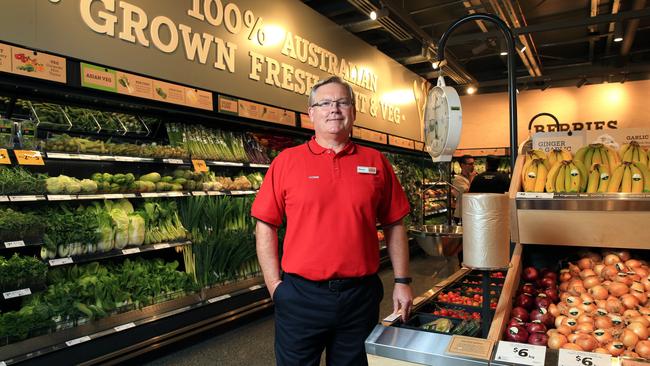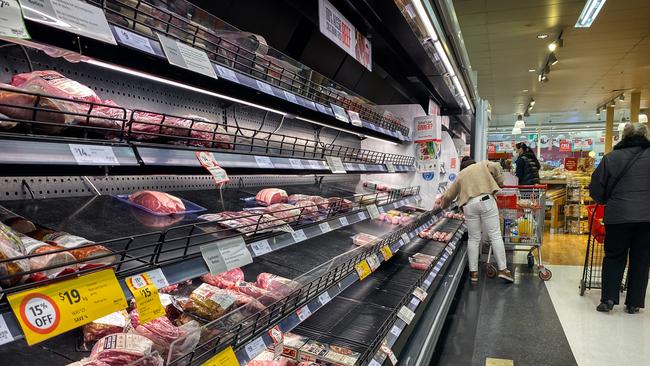Coles boss wary retail lift will not last
Coles boss Steven Cain has taken aim at the effervescent mood of the nation’s retailers.

Coles boss Steven Cain has taken aim at the effervescent mood of the nation’s retailers revelling in record profits by warning tapering stimulus payments and reduced immigration could depress sales for not just supermarkets but the rest of the sector as Australia’s population shrinks.
Amid a profit reporting season where a range of businesses from car accessories outlets and fast-food chains to camping suppliers and coffee machine makers have posted unprecedented sales, Mr Cain said the tailwinds from COVID-19 would lighten and the reality of a smaller population would not only dent supermarkets but could inflict damage across the wider retail sector.
Retailers dependent on population growth would be especially vulnerable given as much as one third of improving sales flowed from Australia’s historic annual immigration intake before international borders were sealed shut due to the COVID-19 pandemic.
And it wasn’t just food and grocery chains in the gun.
“What I would sort of avoid is to look at every half and expect every business gets better every half when you’ve got COVID tailwinds turning to COVID headwinds, and the point I was trying to make today was that people who said trends that will be a long term benefit to supermarkets - which is true - but not as big a benefit as what will be a negative impact from immigration as an example,” Mr Cain told The Australian.
“Because immigration has provided at least one third of supermarket growth in the past and it won’t just impact the supermarket sector, it will impact other sectors and of course it’s a cumulative thing because if you lose 1 per cent through immigration for three years then your population at the end of it is 3 per cent lower than you would have otherwise had.
“And the meter has started,” Mr Cain warned.

Furthermore, he said the benefits of recent improvements in both employment numbers and consumer confidence may be partly offset by a reduction in fiscal stimulus measures introduced during the height of the pandemic.
Coles on Wednesday reported an 8 per cent rise in revenue for the December half to $20.57bn and a 14.5 per cent rise in net profit to $560m, but it came with the caveat from Mr Cain that he expected a moderation in 2021 for industry sails.
This easing sales trajectory looked to have already begun to emerge as a trading update from Coles for the first six weeks of 2021 showed like for like supermarket sales slowed to 3.3 per cent from 5 per cent supermarket sales growth in the previous quarter. Online sales, which boomed through COVID-19 lockdowns, also came back to earth to be up 37 per cent in early 2021 against growth of 48.3 per cent for the first half.
The market reacted poorly to the outlook, with Coles shares falling 5 per cent before closing down 98 cents, or 5.4 per cent, at $17.20.
However, Mr Cain said Coles was a stronger business going into COVID-19 and in its best shape since the demerger from Wesfarmers almost three years ago.
“Versus where we were a couple of years ago we are in a much better position … customers have never been happier, suppliers have never been happier and our team is fully engaged. So I feel like we are in a good spot, but we are about to go into a bit of turbulence.”
The supermarket’s journey through 2021 would then be bolstered by strategies such as an extra $100m on top of the planned $1bn in capital expenditure that is partly directed at improving its local stores where shoppers are opting to go as well as an improved online offer.
“Most businesses cycling through COVID will either go from headwind to tailwind, or tailwind to headwind, and that will create a bit of turbulence. Once that has passed the market will grow again but it is unlikely to be growing as fast as it did in the past because of the immigration effect and all we are trying to say is that we are executing the strategy well, we are going to continue to improve the ranges, continuing to take costs out of the business and that will continue to set us up.”
The more conservative outlook from Mr Cain for its supermarkets and liquor business is against the experience of the December half which was dominated by increased sales from elevated levels of in-home consumption as consumers stripped the shelves of goods.
The supermarket giant said sales revenue for the supermarkets arm increased 7.3 per cent to $17.8bn as EBIT increased by 14.4 per cent to $903m driven by growth in sales, gross margin improvement from strategic sourcing and supply chain efficiencies, partly offset by an increase in administration expenses and millions of dollars spent on making its stores COVID-safe.
For its liquor arm, led by its banners such as First Choice, sales increased 15.1 per cent to $1.96bn reflecting strong performance across all banners, channels and categories, particularly e-commerce and larger format stores as consumers in lockdowns spent up on booze. Liquor EBIT increased by 36.8 per cent to $104m.
Coles declared an interim dividend of 33.0 cents per fully paid ordinary share, up from 30 cents in 2020, with a payment date of March 26.





To join the conversation, please log in. Don't have an account? Register
Join the conversation, you are commenting as Logout